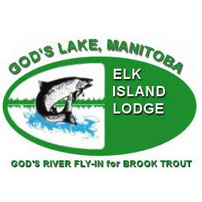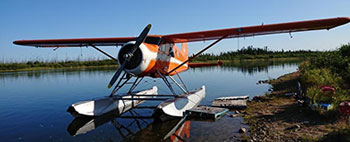History
There’s more than just fishing at Elk Island Lodge. We have nature walks to the old mine site, plenty of wildlife, and canoeing.
In 1824 the first Hudson Bay Post was established on God’s Lake, Manitoba, thus commencing development of the area.
Business for the company was probably marginal since the Post closed in 1832. It was subsequently reestablished in 1868 and once again abandoned in 1872.
Finally, in 1888 or 1889, a Bay Post was located on the North Shore which resulted in a long term presence in the area. Trading conditions apparently improved, and the Hudson Bay Company continued operations at Gods Lake until 1964 although the facility at one time was moved to Gods Narrows with its final location at Elk Island.
In the fall of 1932, Gods Lake was catapulted from relative obscurity to the forefront of the news. About five years after the first prospectors were known to have visited the area, R. J. “Bob” Jawsey and Archie McDonald flew in with a canoe from Knife Lake, and landed on the North side of Elk Island. Unbelievably, within a few hours after landing and while looking for a camp site, a strike was made a few hundred yards west of Elk Island (on what is now known as Jawsey Island) from which “gold was panned freely”. Numerous claims were immediately staked and as rumors of the strike broke out, other prospectors entered the area and laid claim to a large part of the Northern shore of Elk Island, and many of the islands to the North, and North-West, of Elk Island.
Claims were consolidated, and at one time during early 1933, some five companies were actively involved in trying to determine the value of their holdings. On October 18,1933, Gods Lake Mines commenced drilling their #1 shaft which ultimately reached a depth of 905 feet. Subsequently a second shaft was developed about a mile west of the original shaft, and finally reached a depth of 1865 feet which provided for a total of 12 levels of ore recovery.
To support this effort, over 8200 tons of freight had to be hauled in during the winter over a new 130-mile road connected to mile 286 on the Hudson Bay Railroad. One reference on cost indicated a charge of only 22¢ per ton mile, which apparently also included the cutting of the road. Not only as the mine developed, a 1900 HP power plant was constructed at Kanuchewan Rapids and 42 miles of line strung so that electric power was available for the mine on August 20, 1935.
Initial production commenced in 1935, peaked in 1939, and the mine was finally shut down in September 1943. During this period it produced more than $60,000,000 in gold and silver ore based on prices at the beginning of 1988. While in operation the mine supported a local population of approximately 400 people, and a town that included a clubhouse, ice rink, movie house, and church.
With the demise of the mining activity, a few forward looking men recognized the great potential Gods Lake offered for spectacular fresh water sport fishing located in a tremendous wilderness setting. Gods Lake, with over 400 square miles of surface area (1/3 the size of Rhode Island), has large areas of water with depths in excess of 150 feet, with a known depth of 400 feet, thus maintaining a surface temperature that normally does not exceed 60ºF. The lake therefore contains a large population of Lake trout, and the cold water allows catches of this species near the surface during the entire season.
The lake also has large shallow areas like Bayly Bay, Little Gods Lake, and the area south of Gods Narrows where the average depth is only 25 feet which support large quantities of Northern and Walleye.
And of course, the outlet of this great lake is the fabled Gods River which has some of the best Brook trout fishing on the North American continent.Over the past years Gods Lake has produces the following local records: Lake Trout – 53lbs. 4ozs., Walleye – 14lbs. 3ozs., Northern Pike – 36 lbs. 2ozs., Brook Trout – 9lbs. 8ozs., and year after year it produces trophies for many anglers.
Elk Island Lodge, strategically located to pursue all species of fish, offers great accommodations plus the unique opportunity to investigate the remains of this former thriving gold mine operation.

